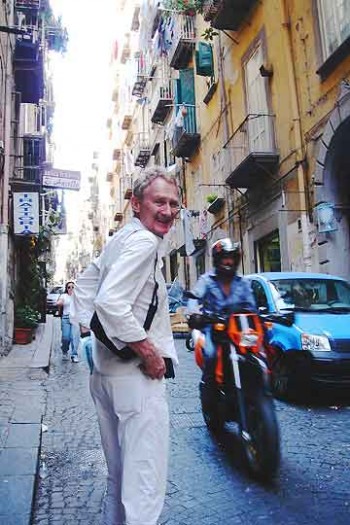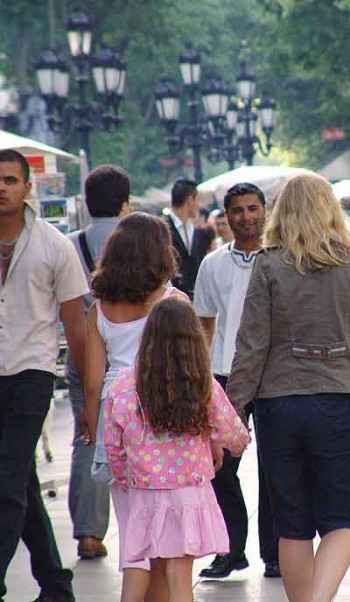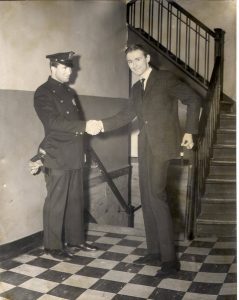
Bob Arno, a security consultant [as well as a comedy stage pickpocket], is the world’s most prominent pickpocket. Speaking to 02B, Arno lifts the lid on the Barcelona street crime scene. According to him, out of a thousand cruise-goers disembarking in Barcelona on any given day, five will be stripped of their belongings.
By Ignasi Jorro in Barcelona, 23/02/2014
Not many former pickpockets pride themselves on having been featured on the frontpage of Time. Bob Arno is one of them. He is often described as “the world’s most famous pickpocket” and praise pours in for his “unrivalled skills”. Bob Arno has snatched his way into the Wall Street Journal, CNN, and New York Times. National Geographic handpicked him for the acclaimed documentary Pickpocket King.
Now a security consultant, Bob Arno has a conference-packed agenda, giving 25 lectures a year on average. The pickpocket-turned-pundit works closely with tourist firms and runs a successful blog on worldwide crime.
02B- When was the last time you visited Barcelona?
Bob Arno- We visit Barcelona every summer, sometimes for a week or so, or several times for a day or two between May and November. The reason for our frequent trips is that we work with various travel companies, like the cruise industry, which brings us to Barcelona.
Bob Arno on Barcelona street crime statistics
02B- How would you describe the “pickpocket scene” (if it can be called so) in that city?
BA- Extremely high, compared with per capita statistics of other tourist cities like Rome, Paris, Copenhagen, and Prague. These other cities also have high pickpocketing rates, but not as varied and blatant as in Barcelona
In my own surveys, I have found that of 1,000 tourists visiting from a cruise ship (for five to eight hours), three to five persons will experience a theft or an attempted theft. Numbers are much lower for the same 1,000 cruise passengers visiting Nice or Athens.
The good news is that lately numbers have come down as to cruise passengers—day visitors who do not stay over night. But young hotel guests, 18-30 years of age, often do not bother to report the theft of a wallet or mobile phone, skewing the numbers.
Bottom line: I would say that the average number of thefts (real losses versus failed attempts) have decreased from over 100 per day, to 50-100 per day.
02B- But, who robs in Barcelona?
BA- Categorizing pickpockets in Barcelona is a complex endeavor. Here is an incomplete list the many players:
• Local gypsy families, who might have arrived many years ago from Kosovo or other war-torn regions, either first or second generation. A decade ago these perpetrators were a serious nuisance in Barcelona and probably constituted over fifty percent of the action. It is far less today.
• North African pickpockets who reside in France (especially in Paris) and make brief trips to Barcelona to practice their trade
• South American pickpockets who reside legally or illegally in Barcelona who specialize in advanced pickpocketing techniques like “la mancha,” the pigeon-poop ploy
• Itinerant pickpockets from Romania. Men and women, often very skillful in their art. Within this group are the pickpockets who specialize in “Apple-picking,” or iPhone-grabbing.
• Occasional well-organized troupes from Poland, skillful and very experienced. They’re a small percentage of the pickpocketing population in Barcelona
You will notice that we have not yet listed any local residents. It appears that over ninety percent of pickpockets in Barcelona are from other parts of Europe (or the world).
02B- How would you describe the response by authorities, including police forces, etc?
BA- I have always wondered why tourism organizations and politicians never combined forces and tackled the crime reputation that Barcelona gradually gained. The city has a very poor reputation that lingers to this day.
02B- In that case, what would you advise them to do to tackle the issue?
BA- I believe with absolute confidence that the police divisions working the Barcelona street crime detail know exactly who the culprits are, and they could quite easily apprehend the majority, and either expel or lock them up.
But it’s not that easy. It’s the judicial system we’re talking about and the expense of sentences. For a start, I would have a long session with the police chiefs and their superiors about morale and attitude toward tourists reporting crime. I’d like to see more compassion from the officers, more detail-oriented report forms, more translators, and a system that measures behavior of police officers who come in contact with tourists. Also needed: an independent commission that looks at all facets of Barcelona street crime, and which then reports back to the political powers.
For example, a pickpocket (in Paris) who has one arrest record, can be apprehended and prosecuted if they behave as if they are going to to steal from a victim.

02B- Which would be the main techniques?
BA- Depending on the nationality of the perpetrator, the techniques vary.
• First and foremost, opportunity theft when a victim does not protect his belongings. For example, she places her handbag on the floor in a restaurant without realizing that the entire bag can be pulled away from below.
• Pickpockets sandwiching victims at door entrances in the metro during rush hours.
• Thieves working clubs and restaurants who especially target the elderly (who are gullible or less mobile), and also the youth (in their late teen years or early twenties) who are still trusting, not yet cynical, and easy to distract. These thieves also work at big club events and concerts.
• The classic “pigeon poop” smear. A gooey mess is applied onto the innocent victim and then, a minute later, the pickpocket approaches the victim and volunteers to help clean it off. In the process, the pickpocket can invade pockets while distracting with cleaning the spot. It is more prevalent in Barcelona than elsewhere.
• Luggage thieves. Tourists arrive at a hotel and unload their bags from a car, leaving a small backpack or laptop case unguarded. While the bags are unattended, thieves speed by on a scooter, snag the laptop case, and speed off.
• Shoulder-surfing, in which the thief watches the cash machine-user from a distance to learn his PIN. The target is then followed until the thief gets (or creates) an opportunity to steal the bank card.
02B- What differences, if any, has the pickpocket community in Barcelona with similar major capitals around the globe?
BA- Most of Barcelona’s pickpockets are opportunists; fewer are very skillful ones. It’s a volume operation at the lower end, because Barcelona is so packed with visitors seven months of the year.
02B- How has the recession affected the pickpocket scene?
BA- Not much. They may have to steal an extra wallet or two to get the money they need.
Pickpocketing is inherent of large crowds, and so is on the type of tourists who visit Barcelona -some gullible, some young. Since Barcelona is such a desirable destination, many visitors are new to travel and naive.
02B- What are your future projects as an expert in this field?
BA- Since my National Geographic film, Pickpocket King, was released two years ago, I am less effective infiltrating or establishing rapport with thieves. But I am able to work closely with many law enforcement agencies across Europe, training and discussing policies. It is my strong belief that the best way to reduce diversion theft is to educate the public and make them aware of the basic techniques of thievery. With a few basic precautionary rules we can reduce this Barcelona street crime by more than half.







5 Comments
Wow! Mrs. Lopez, what a story! I wonder what the local citizen said to make the police lay off. Your husband must have put one thief out of business for at least an hour.
We survived Barcelona last summer. But a pickpocket gypsy woman did not. My husband was carrying a large box and smoking a cigar our last night on Las Ramblas when he noticed a hand in his pocket. He took the cigar out of his mouth reached down and planted it squarely on her hand. She called the police over and he almost took my husband away. Fortunately, a local intervened on his behalf.
Sorry to hear it, Waleed. The Metro’s so full of tourists and potential victims I don’t think the pickpockets need marks pointed out to them. They’re quick and prolific, and fail many times throughout the day. They don’t care about failing—they just move on and try someone else.
We read up a lot on scams and tips to be aware of pickpocketing while in Barcelona. Visiting this past week and traveling frequently on metro with a child in stroller, my wife and I were able to watch out behind each others’ backs while moving. Luck ran out on last day (and we probably became a bit relaxed and less vigilant) when we took a crowded train from Ciutadella Vila Olimpica and I got sandwiched next to the door, naively thinking it’s rush hour so nothing alarming. The b@stards took my iPhone from front jeans pocket! Later I realized a lady in the street, who offered and helped us point towards the metro station while we were trying to find it, probably alerted others of oncoming ‘tourists’. Ourselves to blame, but it’s human.
What an irritant to otherwise lovely city!
I saw the “luggage thieves” in Barcelona. It was our arrival destination before our Mediterranean cruise. Our bus arrived at the hotel, unloaded all the luggage onto the street to be carried by hotel guys inside. A woman’s carry-on, at the edge of the stack, disappeared. And would you believe she had put her laptop, cell phone, passport and all her money in that carry-on? But people need to be aware that crimes of opportunity happen everywhere. Even here in lovely Cuenca, Ecuador. And even in Seattle, iPhones were a big snatch-and-run target. Keep up the good work stopping those crimes!